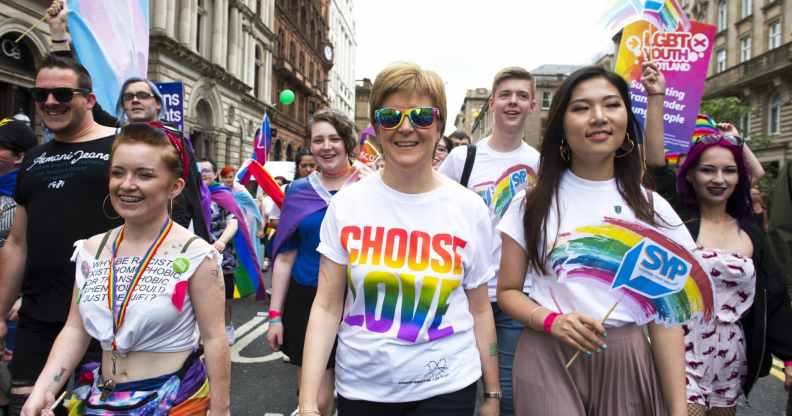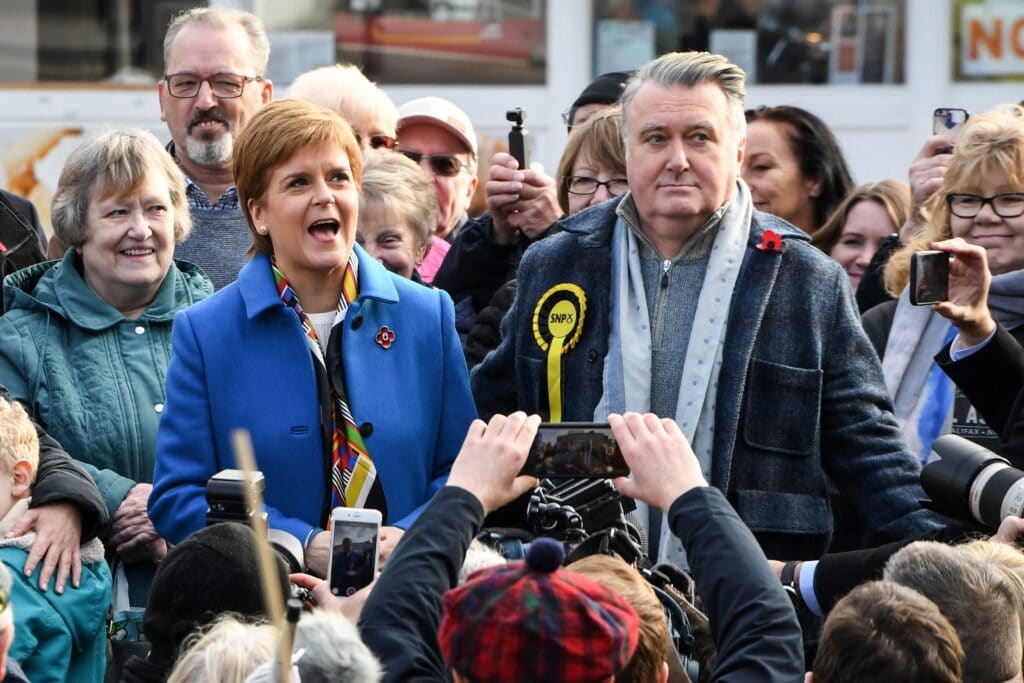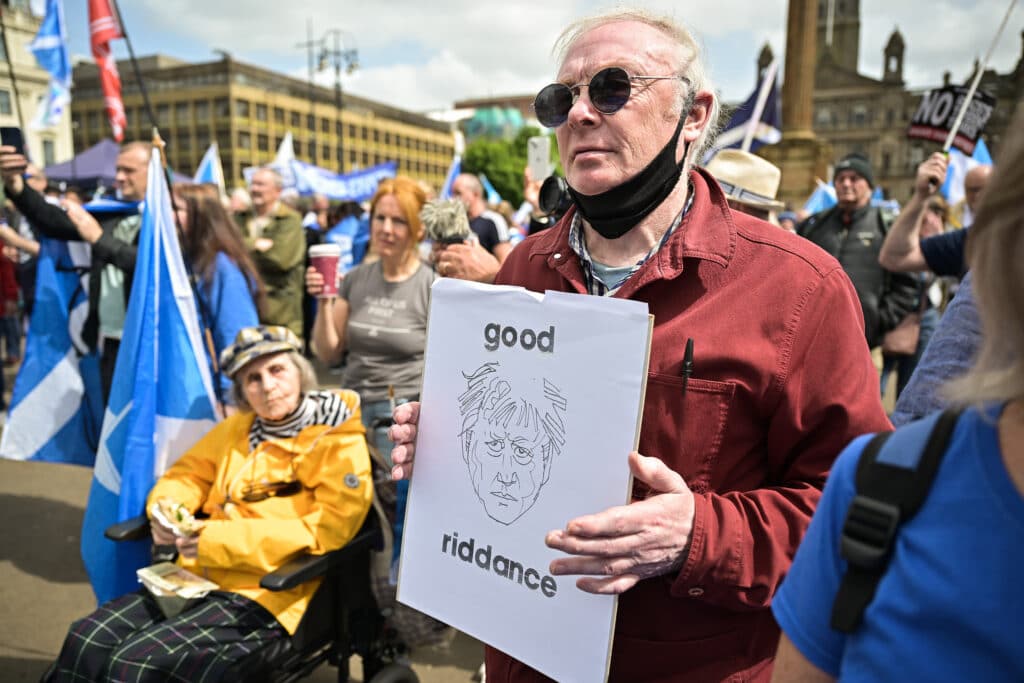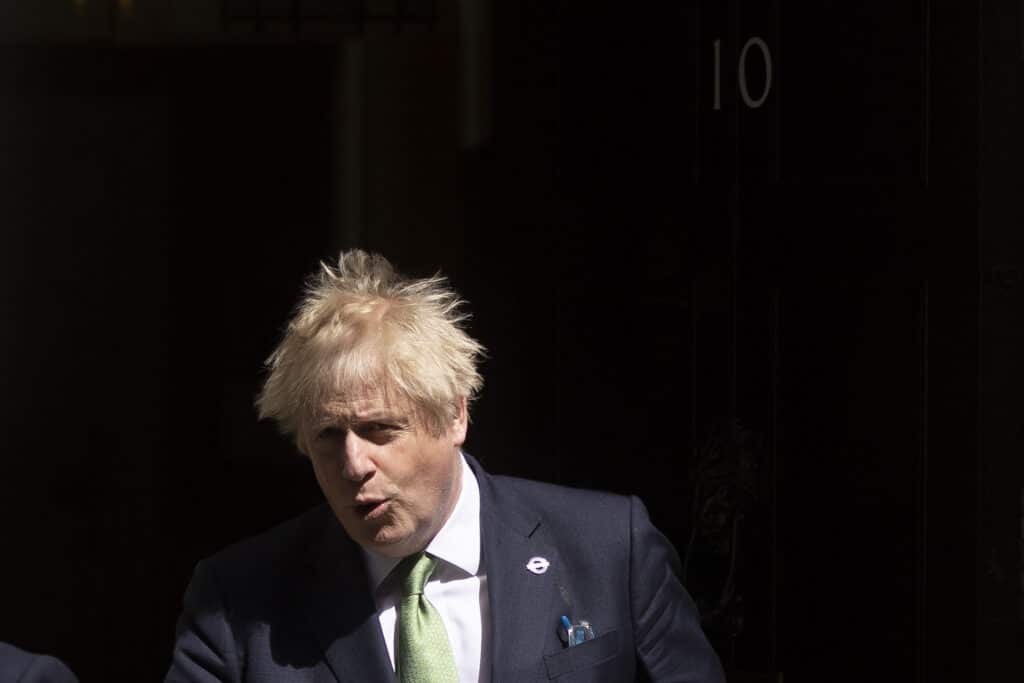Scotland leaving UK would ‘create best possible future’ for LGBTQ+ rights, say pro-independence MPs

Scottish first minister Nicola Sturgeon has relaunched her bid for Scottish independence – but how would that impact LGBTQ+ rights? (MacDonald/SNS Group via Getty Images)
Scotland’s first minister Nicola Sturgeon has announced plans for a second Scottish independence referendum – and it could decide the future of LGBTQ+ rights in the country.
Sturgeon proposed to Scotland’s parliament, Holyrood, a date of 23 October, 2023 for the second vote on independence in a decade (dubbed indyref2).
While it is still unclear whether the referendum will even go ahead – it’ll be up to the Supreme Court to decide – pro-independence LGBTQ+ politicians and voters believe that an independent Scotland could be beneficial for the community.
Scotland remains divided on whether to leave or remain in the UK. Staying in the union has a narrow lead of 46 per cent to 44 per cent, according to a poll published Thursday (30 June) by market research company Savanta ComRes.
John Nicolson, the SNP’s shadow culture secretary and one of the UK’s most prominent gay MPs, says Scotland becoming its own independent country would liberate it from Westminster, whose track record on LGBTQ+ rights has been spotty at best recently.
“I would like not to suffer this constant embarrassment I feel whenever I see Boris Johnson, wondering what foolish or offensive thing he’s going to say next or what minority group he’s going to decide to attack in order to provide red meat for his backbenchers and tabloids,” he tells PinkNews.
Nicolson pointed to Downing Street’s repeated failures to protect the LGBTQ+ community, especially trans people. From excluding trans people from a conversion therapy ban to dropping life-saving reforms to gender recognition law, Nicolson says Holyrood can simply do it better – and what’s more, it already is.
Scottish lawmakers are already drafting an inclusive conversion therapy ban and are pushing ahead with reforming the Gender Recognition Act, a piece of legislation Nicolson says has been weaponised by Westminster for its “nasty culture wars”.
“The Scottish government and Holyrood have shown themselves to be very progressive and if Scotland were to become independent, we’d see a continuation of this,” Nicolson says.
Scottish independence could lead to a kinder asylum system
While Scotland has control over health and education as part of the devolution settlement, an independent Scotland would gain full control over policy areas it does not own, like foreign affairs.
One thing Nicolson hopes Scotland would do differently is to treat queer refugees and asylum seekers respectfully.

Nicola Sturgeon (centre left) and John Nicolson (centre right). (ANDY BUCHANAN/AFP via Getty Images)
Only on Wednesday (29 June) did the UK Home Office deport a gay man to Nigeria, despite campaigners making clear it was a near-certain “death sentence”. This is just one example of the government department’s legacy of disbelieving asylum seekers and rejecting more than half of claims made on the basis of sexual orientation.
And it’s about to get even worse. Home secretary Priti Patel’s Nationality and Borders Bill will make it even more difficult for queer refugees to seek sanctuary in Britain. At the same time, some will be forcibly “off-shored” to Rwanda as part of a new immigration pact with the central African nation.
“I’d like to see a Scotland where those seeking asylum on our shores are welcomed rather than be used as whipping boys for tabloid outrage,” Nicholson says.
“We have a prime minister at Westminster who described gay men as ‘tank-topped bum boys’ and we have a first minister in Scotland who has embraced LGBTQ+ rights and who has led an LGBTQ+ Pride march.
“That says everything I think about who we’ve chosen as our leader.”
Joe FitzPatrick, SNP MSP for Dundee City West, says Westminster has long hobbled Scotland’s “ambition to be a fairer, more equal country”.
“Whilst the Scottish government uses the powers at its disposal to make fairer decisions, with transformational policies, it is only with the full powers of independence that we can go further and create the best possible future for people across Scotland,” he says.
An independent Scotland would be a ‘safe place for marginalised groups to live’, says voter
Calls for independence aren’t just limited to the SNP. The Scottish Greens say a vote for independence is a vote to let Scotland “protect” LGBTQ+ people.
Maggie Chapman, the party’s equalities spokesperson, says: “Since Boris Johnson entered Downing Street he has waged a vile and dangerous culture war against our LGBTQ+ community.
“He has U-turned on banning conversion practices and purposefully fuelled the worst kind of misinformation against our trans siblings.”
The Scottish Greens in comparison, she says, have secured emergency funding for trans healthcare and plan to cut waiting times – something England hasn’t exactly rushed to do.
“With independence, we can protect that progress and do even more,” Chapman says.
Cameron Downing is a non-binary person working as a communication officer for Out for Independence, the SNP’s LGBTQ+ wing.
He used to be on the fence when it came to Scottish independence. But over the years, Westminster has given them more than enough reasons to come out swinging for leave.
“I just feel as a sovereign nation that has its own parliament and its own people we should be able to run things without having to put it past another government first,” they say.

Some who support Scottish independence have expressed frustration at Boris Johnson’s leadership. (Jeff J Mitchell/Getty Images)
The fact that Scotland hasn’t had a Scottish Conservative government in half a century, and how the country voted to stay in the European Union in 2016 shows how different Scotland is from England, Downing says.
When it comes to queer rights, Scotland has done its best with the powers it has, such as becoming the first country in the world to teach LGBTQ+ issues in school.
Downing says: “But we’re not seeing a push for legislation like that in England, Wales and Northern Island. I would absolutely push for that to happen in the rest of the UK, to give them the same advantages that queer people in Scotland have.
“It just shows the different paths the countries are taking.”
But not everyone thinks Scotland going it alone is a good idea. Toni Sword, the head of digital for pro-union think-tank Our Scottish Future, says: “There is a lot at stake in the constitutional debate for every Scot – from the financial security of the NHS to maintaining and improving economic ties with Scotland’s closest neighbour in England.
“One thing that definitely is not at stake is support for LGBTQ+ rights and inclusion.”
Sword stresses that the LGBTQ+ community across the UK must remain united to pressure the Tory government to “make good” on their campaign promises, such as an inclusive conversion therapy ban.
“The beauty of the LGBTQ+ movement has always been in its solidarity and stubborn refusal to recognise borders or differentiate between nationalities. Equality for all, powered by solidarity,” she says.

Campaigners say British prime minister Boris Johnson’s anti-LGBTQ+ stance is to appeal to hardline right-wing voters. (Dan Kitwood/Getty Images)
“By splitting up the UK there is a risk in slowing the consensus of progression across these islands and undermining the ability of our different nations, at different times, to pull one another along.”
Scotland in Union, a pro-UK campaign group, says that Scotland already has the devolved power needed to legislate LGBTQ+ issues.
“This includes relevant areas of health and education policy, as well as more specific laws around same-sex marriage and gender recognition,” says the group’s chief executive, Pamela Nash. “To be clear, Scotland does not need to leave the UK for Scottish people to make different rules for ourselves in these areas – this already happens.”
She adds: “A referendum by its very nature will divide Scotland in two, and aims to divide us from the rest of Britain. Let’s reject the politics of division and work for our whole country, the UK, to be inclusive and united.”
Nevertheless, an empowered Holyrood could have the power to change the lives of LGBTQ+ Scots – and among them would be Chloe Gardener.
Gardener, a 22-year-old journalist, was too young to vote in the first referendum in 2014 – but she knows exactly how she’s going to vote this time around.
“I’ll be voting for independence,” she says. “I think Scotland gets treated pretty badly by Westminster and it would be nice to be able to make our own decisions without having to get the say-so from Westminster.”
Like Nicolson, FitzPatrick and Chapman, Gardener described Westminster’s policy-making when it comes to queer rights – and minority rights in general – as lacklustre.
She’s especially concerned about justice secretary Dominic Raab’s plans to scrap the Human Rights Act and replace it with a “Bill of Rights”.
“If Scotland was to become independent, I think it would be good for any marginalised group, whether that’s LGBTQ+ folk or people of colour, because of the high likelihood that the new Bill of Rights will affect marginalised groups,” she says.
“It gives me hope that if we can get independence,” Gardener adds, “not only will we be independent, but Scotland will be a safe place for marginalised groups to live”.

